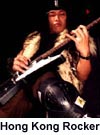"Black Techno", A Meditation on the Hong Kong Handover
By Steven Schwankert
 The Hong Kong Handover inspired two types of extreme emotion: elation for millions of Chinese North and South of Lo Wu, thrilled that the colonial era had ended; and sadness, for many British, some Chinese, and many outside observers who expected the economic prosperity and civil rights the colony
enjoyed to sail away with Prince Charles and Chris Patten aboard the royal yacht Britannia.
The Hong Kong Handover inspired two types of extreme emotion: elation for millions of Chinese North and South of Lo Wu, thrilled that the colonial era had ended; and sadness, for many British, some Chinese, and many outside observers who expected the economic prosperity and civil rights the colony
enjoyed to sail away with Prince Charles and Chris Patten aboard the royal yacht Britannia.
With what is perhaps the first Chinese rock concept album, "Black Techno," Silvester See takes an entirely alternative approach to the event, one devoid of the political and
ethnic overtones that defined the change of sovereignty. The album, which is the solo brainchild of See, a Hong Kong rocker born to Shanghai parents, is a somewhat improvisational, heavy-metal meditation on fin-de-siecle Hong Kong, with lyrics in no less than four languages (Cantonese, English,
French, and Mandarin, but mostly in the latter). The album opens, and is sprinkled with excerpts from various radio and television broadcasts of the handover proceedings. One pictures See sitting in small Kowloon flat, watching the event on TV and wailing away on his guitar.
Eclectic Musical Exploration
The album is neither opaquely dark nor terribly techno, as the name would suggest. Instead, it is an eclectic musical exploration of an event that almost entirely escaped cultural exploration. Only Cui Jian's "Get Over That Day" from the "Born On The First Of July" compilation dared to say that the Hong Kong Handover should not become the defining moment for this generation of Chinese.
While the album is dedicated to a distinct moment in history, it never seems to take a firm position on it. Compared to an overtly moralizing album like Pink Floyd's operatic epic "The Wall," "Black Techno" seems benign. It does not portray the Handover as a necessarily negative event but then nor is it a glowing tribute. Perhaps a more apt comparison would be to Donald Fagan's "The Nightfly," a mixture of ideas and music rather than a near-operatic attempt at storytelling with instruments.
Once and Future Colony
See himself is a unique hybrid to present this material. Hong Kong-born of a Shanghainese mother, the See is one of a small but growing number of rock musicians born in the once and future colony. He embodies the spirit of musical individualism represented by Southern Chinese rockers such as Wang Lei and Pangu, playing many of the album's instruments himself. See said that many of the guitar tracks were done in only one or two takes so they wouldn't be too perfect. "They gotta be heavy. I like heavy," See said last spring just prior to the album's HK release.
Indeed, the album is not perfect. Some of the electronic beats and effects used in the first couple of tracks are downright cheesy. One would require a universal translator for the lyrics to have a full impact, and therefore the album loses some of its force on almost all of its potential listeners.
Overall, it's a ground breaking work by a unique artist. The album ends with the cry of a baby synthesized into a demonic howl and the sound of pouring rain, maybe as heard through See's apartment window on that summer night in 1997. If the album has a message, it's a simple one: the handover came like the weather, inevitable, and all we can do is make the best of it.
TO LISTEN to samples from "Black Techno" at MP3.com click here.

